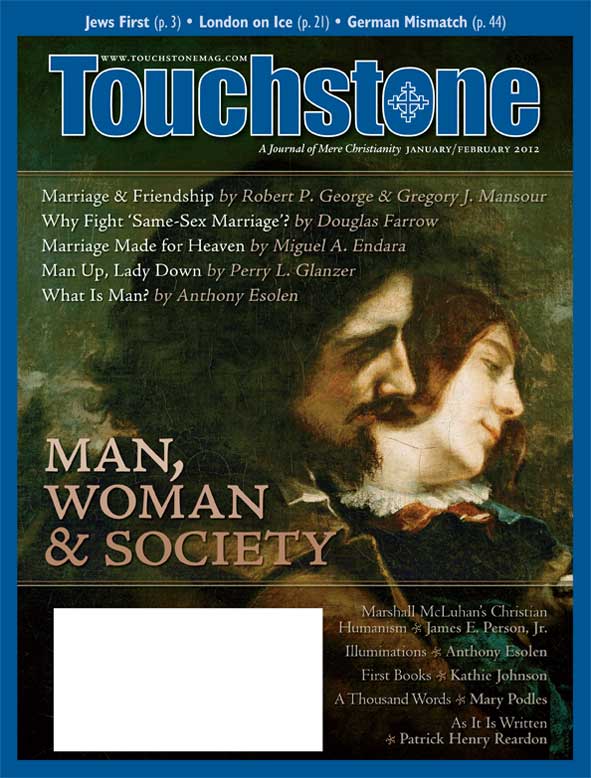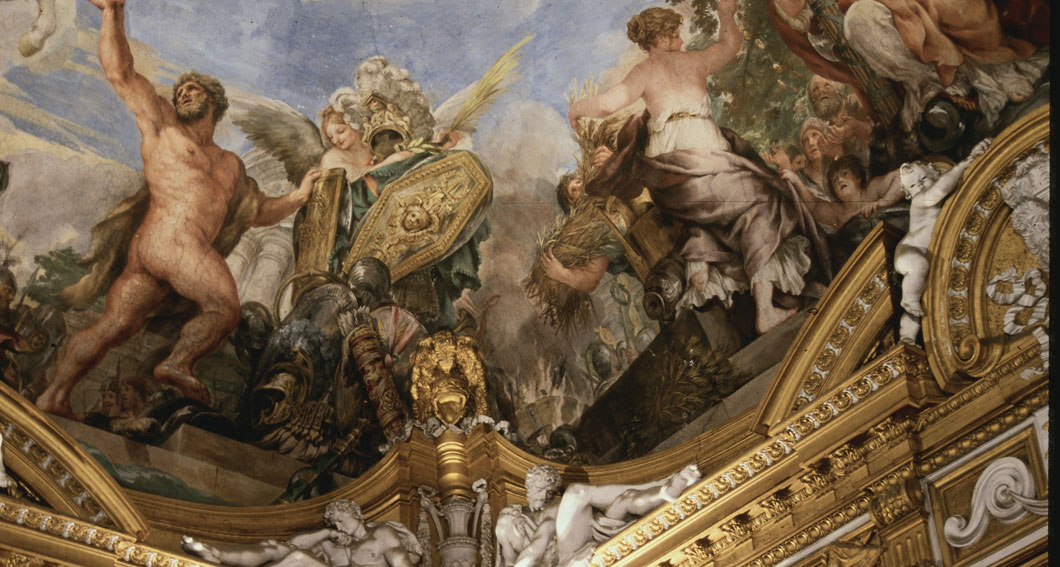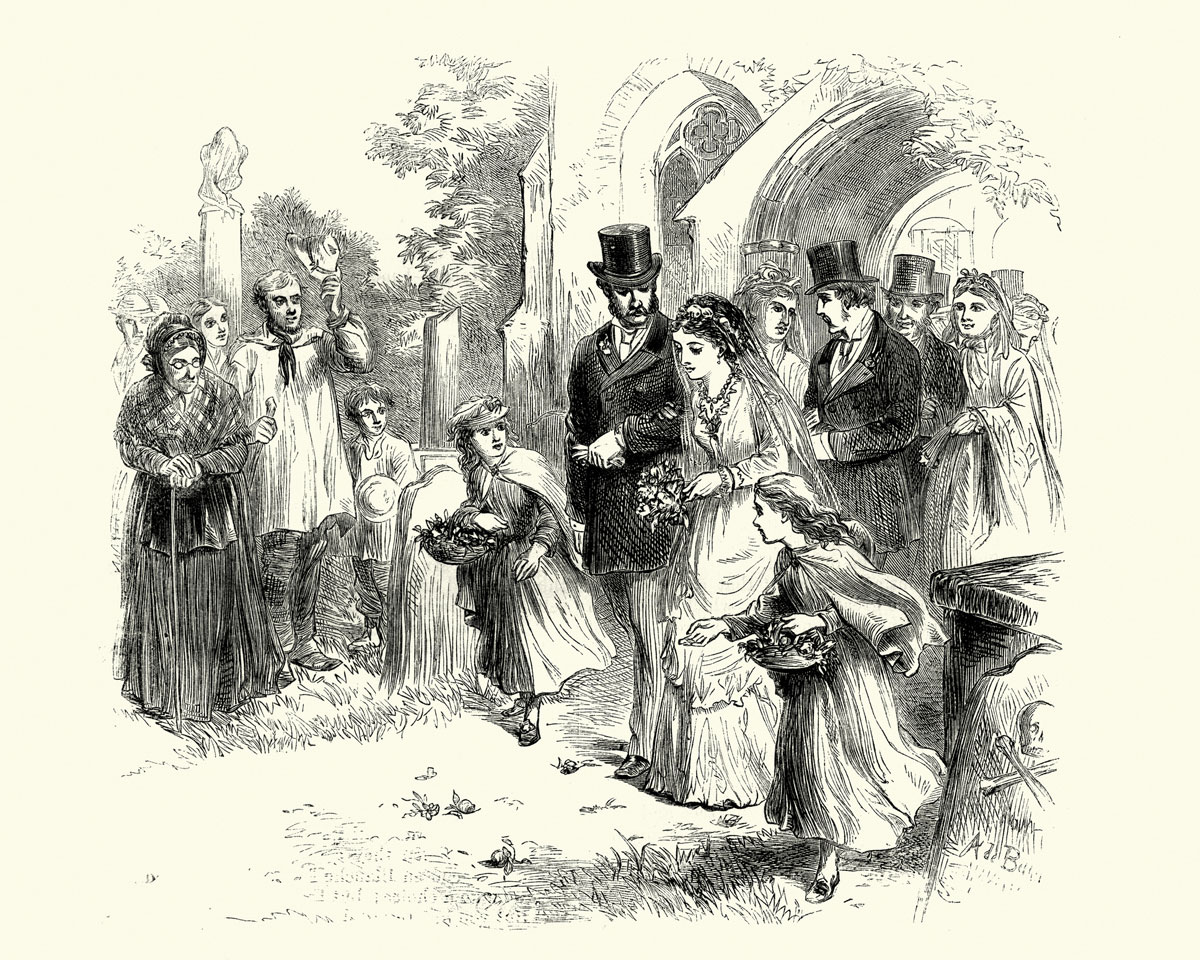Marriage Made for Heaven
On Lust & the Proper Schooling of Sexual Desire
by Miguel A. Endara
In Mere Christianity, C. S. Lewis noted that, “the better stuff a creature is made of—the cleverer and stronger and freer it is—then the better it will be if it goes right, but also the worse it will be if it goes wrong. A cow cannot be very good or very bad; a dog can be both better and worse; a child better and worse still; an ordinary man, still more so; a man of genius, still more so; a superhuman spirit best—or worst—of all.”
In this passage Lewis seems to have had in mind the Latin aphorism corruptio optimi pessima, “the corruption of the best is the worst.” So may we think of Lucifer, the light-bearer in Christian theology and tradition, the one with the potential to produce the greatest creaturely good; yet he became Satan, the Adversary, the one with the potential to produce the greatest creaturely evil.
This idea also applies to natural human inclinations or desires: those with the greatest potential for good also have the greatest potential for evil. A prime example is sexual desire. God created this desire for marital unity and for the procreation and rearing of children in a strong family unit. When two individuals come together as one flesh (Gen. 2:24) in the conjugal union, they may not only experience the most physically and emotionally fulfilling of all human relationships, but also receive a foretaste of the Beatific Vision—the unmediated or direct knowledge of and communion with God enjoyed by the angels and the redeemed in heaven. Such is the potential of sexual desire for good.
But it also has the potential to produce great evil. When the desire for sexual expression is driven by lust, when it is sought for selfish ends and is disconnected from both the earthly goods and the transcendent final end that God has ordained for it, then sex has the power to subvert human well-being and to destroy marriages and families.
Whether we will use our sexuality to produce great good or great evil depends upon how we school the expression of this desire: as a virtue or as a vice.
The Ravenous Nature of Lust
Lust, as Thomas Aquinas explains in his Summa Theologiae II-II, is the inability to govern sexual desire. In Thomistic and classical theology it is classified as one of the Seven Deadly Sins or Capital Vices. These are vices that, through frequent repetition, become pernicious habits, deeply ingrained dispositions or character traits that undermine a person’s physical and spiritual well-being. Conversely, virtues are habits that promote human flourishing.
As with every other vice, lust gradually tightens its grip upon its subject. If a person does not possess the inner fortitude to resist it, it matures into a necessity. As Augustine put it in his Confessions, “The enemy held fast my will, and had made of it a chain, and had bound me tight with it. For out of the perverse will came lust, and the service of lust ended in habit, and habit, not resisted, became necessity.”
In its mature state, lust, like a ravenous wolf, is never satiated. It relentlessly drives those in its grip to seek to pacify, if only transiently, their ever-present hunger for sexual gratification. But the more they gratify their desire, the more famished they become, and the more they seek to satiate themselves once again. With each bout of desire and satiation, the lustful also experience guilt, shame, and sometimes self-hatred, thus allowing them to spiral, ever deeper, without restraint.
In The Screwtape Letters, Lewis explains that the perversion of the natural inclinations that God has given us for our own good becomes “an ever increasing craving for an ever diminishing pleasure.” Indeed, those who have allowed the ravenous wolf of lust to dwell within them live forlorn in grief, finding no respite from the constant demands of their disordered desires.
Dante on Lust
In his Inferno, Dante Alighieri gives us a metaphorical guide to understanding the inner turmoil experienced by the lustful. To understand the metaphor better, we must keep in mind that God’s divine justice, as Dante portrays it, is perfectly executed through contrapasso, the precise fitting of the sin to the punishment.
This punishment is visited upon the sinner in a natural way. We often think that our vices free us to enjoy life, but they actually slowly destroy us. In other words, our sin contains the seeds of our destruction. If we don’t retard their growth through repentance, those seeds will mature to full fruition. Since God respects the autonomy he has given us, he will allow the sinner who so chooses to wallow perniciously in his pet sins for eternity, that is, in hell. The punishment of those in hell, then, consists of experiencing the inevitable consequences of their sin, in its fully mature and invariably destructive state.
Also implied in this view of divine justice is the idea that, since God created us, he knows us better than we know ourselves. Further, he loves us and wants us to flourish as human beings. Thus, his moral laws are a reflection of his love and grace, the principles by which we may flourish. To go against God’s laws is to contend against our own good as well as to contend against God. As Thomas Aquinas states in his Summa Contra Gentiles, “We do not offend God except by doing something contrary to our own good.”
Thus, we are free to follow God and flourish or to follow ourselves and come to ruin. Dante demonstrates this in The Divine Comedy. In the Inferno, we see him as a pilgrim being guided by Virgil on a journey through hell. In Canto 5, the twoarrive on a dark ledge in the Second of the Nine Circles of hell, where they begin to hear a chorus of anguished shrieks coming from the tortured souls who reside there. These are the souls of the morally incontinent, those who subjugated reason to desire.
Kept in total darkness, these sinners are blown about in a never-ending series of sudden and raging infernal storms that represent their uncontrolled desires. The high winds whip around the sinners, snatching them up, thrashing them about, and dashing them to the ground over and over again in an endlessly repeated cycle:
I now begin to hear arising wails of sorrow; I have come where the great cries batter me like a wave pounding the shore.
It is a place where all light is struck dumb, moaning as when high winds from east and west wrestle upon the sea in a fierce storm.
That hellish cyclone that can never rest snatches the spirits up in its driving whirl, whisks them about and beats and butts them.
(translated by Anthony Esolen)
We may surmise that Dante is telling us that something similar happens to the lustful while still on earth. Those who allow their appetites to dominate them eventually find themselves in the darkness that results from the privation of the light of reason. In this state of moral blindness, they are subject to the whirlwinds of desire, which buffet them whenever, for example, they pass by a newsstand displaying photos of scantily clad women, or they catch a glimpse of a sexually attractive person, or they come across a sexually suggestive story or image. Their lust demands satiation, but even if they are able to satisfy it, they later find themselves dashed to the cold, hard, and bitter ground of dissatisfaction, frustration, emptiness, loneliness, and, eventually, despair. The ephemeral satisfaction quickly dissipates, leaving them to contend with the next flare-up of lust in a weakened condition.
Dante’s metaphor, then, vividly portrays the plight of those caught in the throes of lust.
Pornography & Objectification
Those who allow lust to dwell within them invariably objectify others sexually. Pornography, which displays persons (usually women) only as objects of sexual pleasure, is often the culprit that seduces its viewers to become lustful. Pornography tells its viewers that the biographies, subjective lives, and inner worth of the individuals it presents to view are inconsequential. Who the person portrayed really is, what family she came from, how she was raised, what her education or experience may have been, what her goals in life are—none of this matters; all that matters is that she is available for sexual consumption.
Objectification of others leads to the treatment of them as fungible. Since all that matters about a sex object is that she has the requisite body parts and the capacity to use them to quell the gnawing of disordered desire, nothing distinctive about her, nothing that marks her as an individual, matters at all; thus, she is interchangeable with many others.
When we objectify others and treat them as fungible, making use of them solely for our own ends, we strip them of their humanity. But the evil consequences of lust do not end here.
A Portrait of Lust in Marriage
Although the consequences of lustfulness are pernicious for all involved, regardless of their state in life, they are especially so for married persons. The emotional pathologies attendant upon the state of the lust have particularly detrimental effects on a marriage, damaging and sometimes destroying the marital bond. Dante’s description of the inner turmoil engendered by lust does not apply to single people only; it often materializes among the married.
By way of illustration, let us imagine the case of a married man (we could imagine similar cases for both men and women) who spent his single years making forays into illicit sexual expression and has never really repented of his licentious past. Not only that, he remains just as much driven by lust as a married man as he was as a single one. He frequently tries to still the incessant clamor of his lust by conjuring up the shadows of his former sexual experiences, seeking, as he relives them in his mind, to recreate the sense of respite that his distorted memory tells him they once brought him.
Furthermore, accustomed as he was in his single days to a steady stream of facile and fleeting relationships, which provided him with continual novelty while requiring no commitment or restraint on his part, he attempts to pursue this same sort of selfish quest for sexual gratification within his marriage. As he seeks to enter ever more newfangled, novel, and ecstatic realms, he ventures into depravity, yet the deeper he descends, the more blind he becomes to his emotional pathology.
In this prurient state of mind, he makes incessant demands on his spouse to supply him with a continual variety of sexual experiences, including bizarre and degrading acts, which he claims are normal within the married state. He devises sexual pathways for the two of them to travel that would previously have been extreme and abhorrent to him, but that now seem normal and necessary to satisfy his cravings.
The expectations he imposes on his wife are impossible for her to meet, for the more she attempts to satisfy him, the hungrier he gets, and the more extreme his demands become. Thus, she is destined to be met with frequent complaints of sexual dissatisfaction. Soon she begins to feel physically unappealing and frustrated with herself for not being able to please her spouse, and she questions whether the problem lies with her. At the same time, though, she also realizes that her spouse is merely using her to satisfy his own needs, and thus, she begins to feel objectified. These experiences give rise to feelings of guilt, betrayal, mistrust, anger, and confusion on her part.
For his part, the lustful husband, with his unrealistic demands and perverted understanding of the true nature of sexuality, descends into an emotional void, for he loses his capacity for loving spousal intimacy and can only seek yet another temporary assuagement of his gnawing sexual cravings. As his sense of emptiness deepens, he becomes increasingly restless as well, and finally seeks to escape from a marriage that has become ever more sexually confining and emotionally meaningless.
Unrelieved, the continual stresses laid on the marriage by the husband’s lust will cause the couple’s relationship to deteriorate to the point of no return. If no concerted effort is made at repentance and reform, the marriage has little hope of survival, as the whirlwinds of lust will drive both spouses towards divorce. At this point, the couple will descend into a new sphere of great evil, yet it is one towards which the lustful expression of sexual desire naturally leads. Lamentably, many people do not recognize this, and so they heedlessly continue to indulge, rather than resist, the temptation to lust.
Too Easily Pleased
C. S. Lewis, in his Weight of Glory, eloquently captures what it means to put our sexual (and other) appetites first:
We are half-hearted creatures, fooling about with drink and sex and ambition when infinite joy is offered us, like an ignorant child who wants to go on making mud pies in a slum because he cannot imagine what is meant by the offer of a holiday at the sea. We are far too easily pleased.
Many people, seeking to lead full lives, mistakenly and stubbornly believe that because we belong to the animal genus, our desire for sexual expression is little more than a physical need that should be satisfied indiscriminately and continually. Such people are not about to sacrifice the pleasures of the fleshfor the restraints of normative morality, for they view these as shackles on their freedom. Paradoxically, however, the very behavior that we often think freeing is actually enslaving. But we do not perceive this truth, and so we engage in the degrading behavior because, as Lewis notes, we are not able to imagine that “infinite joy is offered us.”
Many people cannot imagine, for example, that little else in our earthly existence fulfills us as much as a harmonious, love-filled marriage. They fail to understand the essence of this type of marriage, of its grounding in a shared and sustained commitment in love that embraces common values and goals. Here, trust and loyalty, openness and respect, care and tenderness, intimacy and interdependence thrive.
In fact, a harmonious marriage creates an existential landscape where the spouses may express and experience the fullness of their humanity in sexual intercourse, giving themselves to one another in body, mind, will, and emotions. Only within this type of marriage can sexual congress both unify the spouses and safeguard fragile human love so that it may flourish in all its beauty. Such is the exemplar of virtuous sexual expression.
A Pointer to the Beatific Vision
The joys that come from sexual expression within this type of marriage are so great that we sometimes imagine them to be the Ding an sich, the thing in itself, the ultimate good, the final telos, the summum bonum of our desires. But, as Lewis points out, “they are only the scent of a flower we have not found, the echo of a tune we have not heard, news from a country we have never yet visited.”
We find a similar idea in Bonaventure’s work, The Mind’s Road to God, if we apply what he says to virtuous sexual expression. Bonaventuremaintains that we may discover God through the vestiges or shadows of himself that he, as the Creator, has instilled in the physical world. To each of his creatures God has given, in appropriate measure according to its kind, the properties of unity, truth, and goodness; and these properties reflect God himself. Discovering this truth leads to God, for it is one of the stages of the human ascent to him.
Similarly, through the joy, beauty, and fulfillment we experience in virtuous sexual expression, we may discern a shadow or vestige, a scent or an echo, that points to the Beatific Vision. The conjugal act itself both points towards and experientially foreshadows the complete joy, beauty, and fulfillment that God intends for us to find in himself. This is the final trans-temporal and transfinite good towards which our desires ultimately point. But as long as we remain “half-hearted creatures,” we cannot imagine that a “holiday at sea,” God himself, awaits us.
In his Sermon-Conferences on the Apostles’ Creed, Thomas Aquinas depicts the Beatific Vision as the experience of life eternal, espoused to God; for God is the fitting end and reward of all our efforts. As part of this espousal, claims Aquinas, we will experience a perfect vision of our Creator, for we will be able to see him clearly, face to face (1 Cor. 13:12). This union consists of intense love and worship, joy and celebration. It also includes the sharing of all these goods with our fellow redeemed, as we rejoice in loving one another as we love ourselves.
Aquinas further maintains that only within the Beatific Vision may we experience the full and final satiation of all our desires, for we humans cannot rest until we rest in God, who has made us for himself (Augustine, Confessions).
The Rewards of Virtue
Woe to us who do not heed the Apostle Paul’s admonition in First Thessalonians: “It is God’s will that you should be sanctified: that you should avoid sexual immorality; that each of you should learn to control his own body in a way that is holy and honorable, not in passionate lust like the heathen, who do not know God” (4:3–5).
The lustful can only enjoy sex at the sensual level, where it is disconnected from a full and satisfying human relationship. Although a lust-filled person may experience many flights of sexual exhilaration, these flights will only ephemerally satisfy his gnawing and incessant cravings. Furthermore, they come at a high price: for the whirlwinds of lust will eventually turn on their host and drive him ever harder toward despair and divorce. For the lustful, then, sex becomes an enslaving and destructive idol that mocks the true beauty and God-inspired goodness of human sexuality.
But the virtuous expression of the natural human desire for sexual intercourse promotes a harmonious marriage and family life and thus is pleasing to God. For those who conduct themselves in a way that is holy and honorable, sexual love becomes a symbol of the perfect love, joy, and fulfillment we will experience on the other side of eternity, when we enter into an everlasting and intimate relationship with God and the members of the Church Triumphant. •
subscription options
Order
Print/Online Subscription

Get six issues (one year) of Touchstone PLUS full online access including pdf downloads for only $39.95. That's only $3.34 per month!
Order
Online Only
Subscription

Get a one-year full-access subscription to the Touchstone online archives for only $19.95. That's only $1.66 per month!
bulk subscriptions
Order Touchstone subscriptions in bulk and save $10 per sub! Each subscription includes 6 issues of Touchstone plus full online access to touchstonemag.com—including archives, videos, and pdf downloads of recent issues for only $29.95 each! Great for churches or study groups.
Transactions will be processed on a secure server.
more on sex from the online archives
more from the online archives
calling all readers
Please Donate
"There are magazines worth reading but few worth saving . . . Touchstone is just such a magazine."
—Alice von Hildebrand
"Here we do not concede one square millimeter of territory to falsehood, folly, contemporary sentimentality, or fashion. We speak the truth, and let God be our judge. . . . Touchstone is the one committedly Christian conservative journal."
—Anthony Esolen, Touchstone senior editor












